An Aberdeenshire mum says her family has been left “vulnerable” after a tortuous journey to help her autistic son.
Karen McNeill forked out thousands of pounds to get private help for her 10-year-old son Cameron. And she says she knows many families in the same situation.
Cameron was diagnosed autistic at the age of four, when the family was living in Poland. They moved to Scotland a year later, and the NHS accepted the diagnosis.
However, like many other autistic children, Cameron has several other conditions.
“Cameron’s autism was clear from a very young age,” says Karen. “He has very complex needs.”
Cameron displays signs of pathological demand avoidance (PDA), which is an extreme resistance to everyday demands and expectations. He also has ADHD, phobias, crippling anxiety and suspected Tourette syndrome.
‘Cameron stopped eating’
However, one of the most challenging aspects of Cameron’s condition is an eating disorder called avoidant restrictive food intake disorder (ARFID). The condition is not as well known as anorexia, but equally devastating in its effects.
“Cameron contracted Covid in February and completely stopped eating for two weeks,” says Karen. “He dropped all of his safe foods and the only thing he will eat now is my homemade flatbreads with garlic butter.
“I’m now baking 15 a day on top of my usual chores. I’m struggling with that, to be honest.”
The demands of day-to-day life can feel overwhelming. “I don’t want my family to end up in crisis, but what we’re doing now is not sustainable,” says Karen.
Autism brings its own unique challenges, and its own unique gifts.
Karen speaks candidly about the importance of remembering that Cameron is a human being with his own likes, dislikes and feelings. A human being caught in a system that the family believe is broken.
Private diagnosis
While Cameron’s struggles are clear to his family, it’s taken numerous meetings, a tribunal and an army of professionals to make any progress in helping him.
In January 2018, Karen enlisted the help of private consultant Dr Elizabeth Shea. Dr Shea diagnosed ARFID.
Of course, many families couldn’t afford that option, as Karen herself points out. The private doctors cost about £175 an hour, and the family also paid £3,000 for an independent report from an educational psychologist.
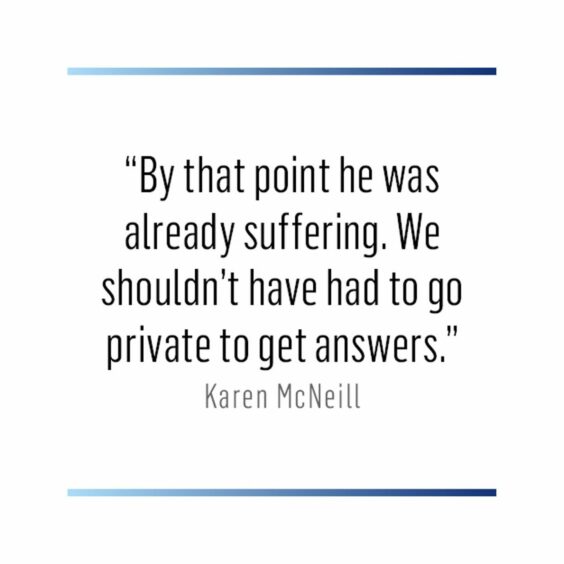 “To be honest, I’d have sold my soul for their input,” says Karen. “It turned out that everything we had been doing was wrong. Offering Cameron food all the time was wrong. Dr Shea helped us develop our basic understanding of the condition and introduced the notion of trust.
“To be honest, I’d have sold my soul for their input,” says Karen. “It turned out that everything we had been doing was wrong. Offering Cameron food all the time was wrong. Dr Shea helped us develop our basic understanding of the condition and introduced the notion of trust.
“If we lose his trust by trying to trick him or push too hard he can just stop eating. If anything is wrong, he blames food. When he was sick with Covid, he blamed his food.”
Karen also took Cameron to a former Great Ormond Street Hospital consultant, who diagnosed joint hyper mobility syndrome.
“He diagnosed Cameron within half an hour,” Karen says. “But by that point, he was already suffering. We shouldn’t have had to go private to get answers.”
‘Difficult to assess’
Unfortunately, a diagnosis is just one step of the journey. The real difficulty is in getting the right support for children when they need it. Documents seen by the P&J show the great complexity of the case.
In October 2019, a review meeting attended by an NHS psychiatrist acknowledged that many of the strategies suggested to help Cameron had already been tried by the family. The review noted that Cameron is “very difficult to assess”.
Sadly, Cameron’s mental health problems continued to cause concern. Nearly two years later, in January 2021, NHS Grampian’s consultant psychiatrist and a nurse from Children and Adolescent Mental Health Services (CAMHS) stated that his conditions are best managed without medication.
With that in mind, the psychiatrist said he would “not routinely see” Cameron again and wished the family well in further treatment.
Feeding tube is a last resort
In August 2021, a letter from a gastroenterologist suggested treating Cameron’s nutritional deficiencies via a feeding tube – something that Karen is keen to avoid.
 “To be fair, the doctor who suggested it meant well,” she says. “She was just trying to give us an option to get things into him. But for us it would only ever be a last resort. His eating disorder is anxiety and sensory driven so we have to exhaust all other options first.”
“To be fair, the doctor who suggested it meant well,” she says. “She was just trying to give us an option to get things into him. But for us it would only ever be a last resort. His eating disorder is anxiety and sensory driven so we have to exhaust all other options first.”
Karen wants to get to the bottom of Cameron’s anxiety before agreeing to a feeding tube, which she feels would traumatise her son.
At a review meeting in October 2021, the professionals recommend that Cameron return to CAMHS for a “holistic assessment”.
However, Karen is exasperated with the whole process and feels “unrealistic barriers” are constantly put in their path.
As such, she is looking outside of the health board for more help. When asked for comment, NHS Grampian said it could not comment on an individual patient.
Clearly, these cases are difficult for everyone involved. Professional opinions will differ, but the McNeill family feels worn out with trying to pick their way through the system.
“This is what happens when the agencies don’t work together,” she says. “The whole thing falls apart and the stress on the family is immense.”
Highland family speaks up
Cameron’s complex medical needs are not unusual. According to Autism Speaks, GI conditions are eight times more common in autistic children, and 7 in 10 will have eating problems.
Other associated health conditions are epilepsy, ADHD, OCD and mental health problems including anxiety, depression and psychosis. In fact, almost half of autistic children struggle with anxiety disorders.
Despite this, the families who reached out to the P&J say there’s still a general lack of understanding.
One family – who did not wish to be named – says that Highland Council “discounted” private reports from their doctors.
Their 13-year-old son was diagnosed autistic at the age of 11, along with anxiety, auditory processing difficulties and dyslexia.
“Highland Council refused to acknowledge [his diagnosis] and told us he could not have persistent literacy difficulties – implying that he just needed to try harder,” said his mum. “He’s suffered many years of trauma caused by his needs being ignored in school.
“We have obtained private reports describing his exact difficulties and the support he needs, but these reports have been discounted by the Highland Council.”
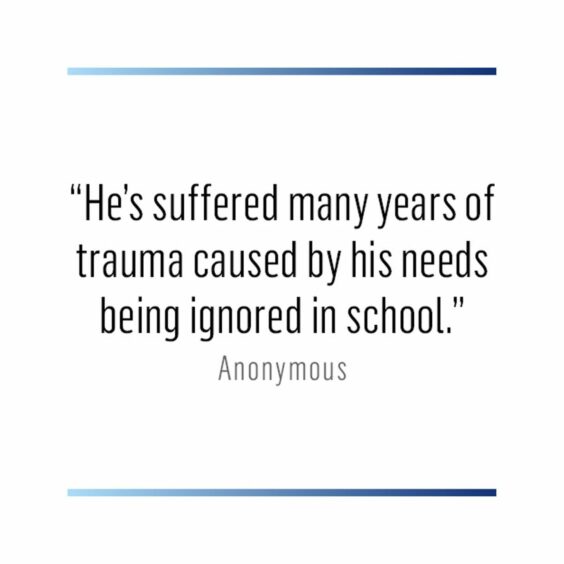 The P&J asked Highland Council to respond to this, and several other cases in the Highland area. A spokesperson declined to comment on individual cases, but said:
The P&J asked Highland Council to respond to this, and several other cases in the Highland area. A spokesperson declined to comment on individual cases, but said:
“The Highland Council is committed in our work to support children with additional support needs (ASN). We work in partnership with parents, carers, children and young people to identify and understand their needs and to provide appropriate interventions.
“The underpinning principle in all of our ASN policies is that children and young people are supported to achieve their potential. Our policy and guidance on supporting children with autism was written in conjunction with parents and organisations supporting families with children who have been identified as autistic.”
Taking the council to court
Karen has had similar struggles with her local authority.
In 2018, she took Aberdeenshire Council to tribunal to get Cameron a place at Camphill School, a specialist education provider in Aberdeen.
Govan Law Centre took up the case, and won.
“Camphill were as good as they could possibly be,” says Karen. “They have a home from home philosophy. Those were the best two years of my life – and Cameron’s – but we’ve had to accept that his needs have changed since then.”
Like many children, Cameron wasn’t able to return to school after lockdown. This means returning to his Co-ordinated Support Plan (CSP) to find other ways to support his learning.
Cameron’s CSP sets out the help that Cameron needs, and commits the council and the health board to providing it.
CSPs are backed up in law, but like many other parents, Karen says it’s had limited effect. “We had to fight to get one, but I have mixed feelings about it,” she says. “It sounds good on paper but it won’t work unless all the agencies contribute to it.”
Vincent Docherty, head of education for Aberdeenshire Council, said the council is reviewing its approach to ASN and CSPs. However, he says support is there:
“Around 43% of our school population is recorded as receiving help with additional support needs, and that help is shaped around their unique needs and circumstances,” said Mr Docherty. “Funding and resourcing around this remains consistent with previous years.
“Any parent who has concerns is encouraged to discuss this with their child’s school in the first instance.”
There is hope
Karen emphasises that her experience is not all bad. Camphill were fantastic, and her social worker is “proactive and creative.”
But too often, parents are left alone to navigate a confusing and stressful journey.
“The whole system is a shambles,” Karen says. “I don’t say that to bad mouth anyone. There are lots of good professionals out there, but the system lets them down.”
Karen has enlisted the help of autism consultant Lisa Moir. Lisa and her son are both autistic, and Lisa wants to use her experiences to support other families in the same boat.
Karen says Lisa has helped to lighten the load.
“I’m a strong person and very capable,” she says. “I’m not someone who will easily say that I need help, but as a family you do become vulnerable.”
Recently, a ray of hope has come from the unlikeliest of places: social media.
Like many of the other families contacting the P&J, Karen has found a warm and supportive community of parents online.
And one Facebook group suggested a simple trick that has already had a big impact on Cameron’s health: a multivitamin sprinkle. Karen has started adding it to Cameron’s flatbreads.
“He was suffering from nutrient deficiency and that affects his behaviour and mental health,” says Karen. “We’re on week six now and it’s amazing. Our dietician asked for the name of it straight away!”
Heart warming as it is to see parents unite, it’s also jarring. I put it to Karen that families shoulder enormous responsibility, simply to care for their child.
“Yes,” she says. “We have to be parents, advocates, psychologists and nurses – and now I’m a baker too.”
Useful links:
Scottish Autism
National Autistic Society Scotland
Govan Law Centre
Read more from our autism investigation
What are the signs of autism in children and how can I get support?
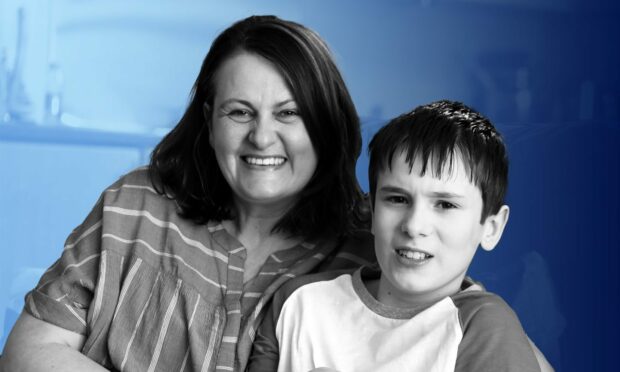
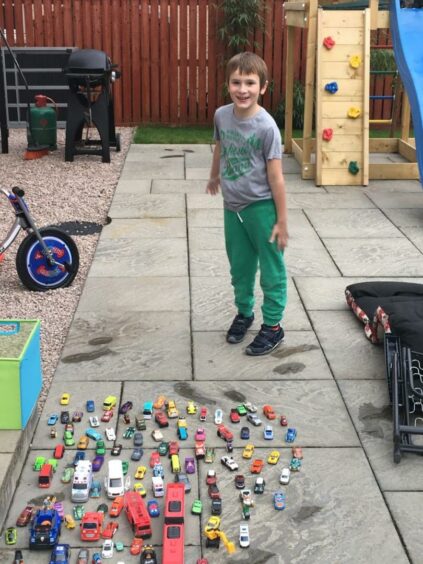
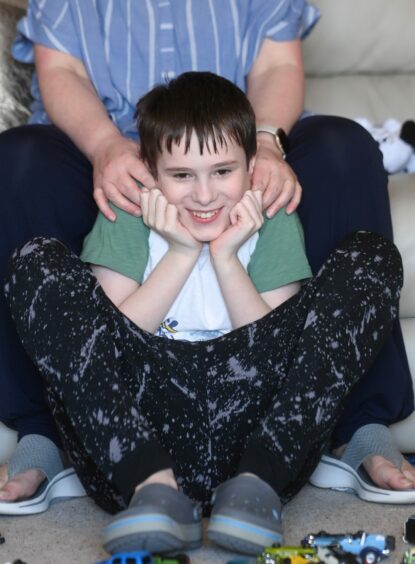
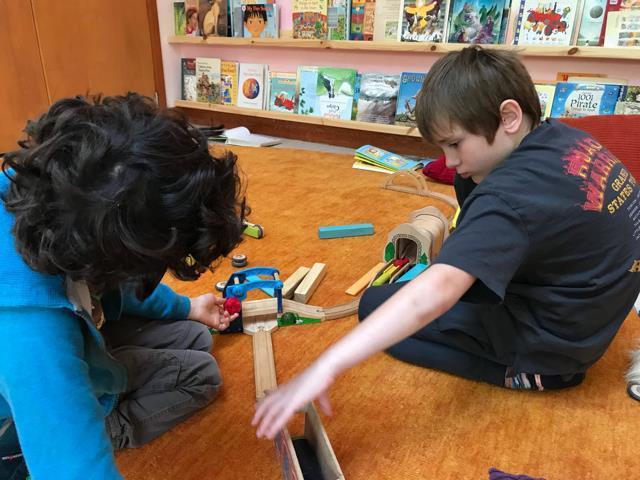
Conversation